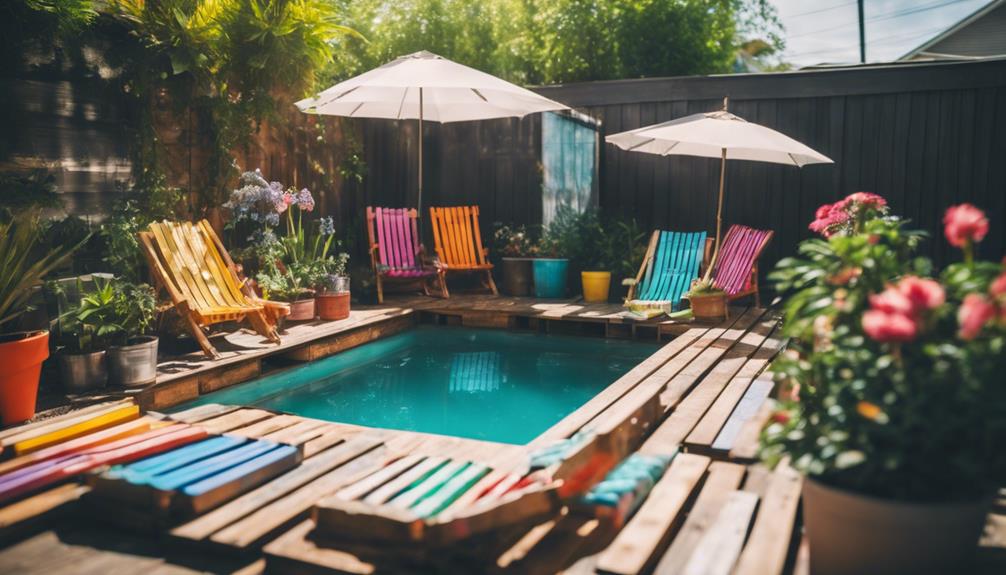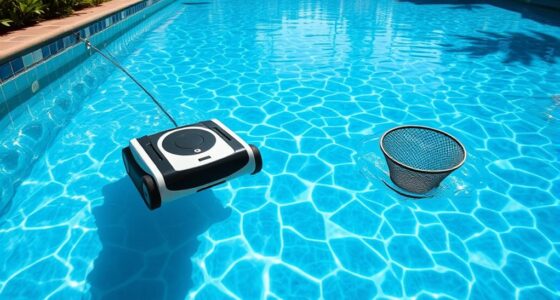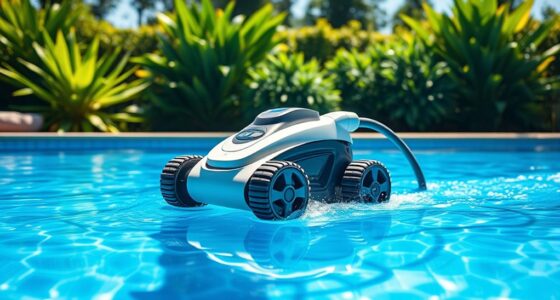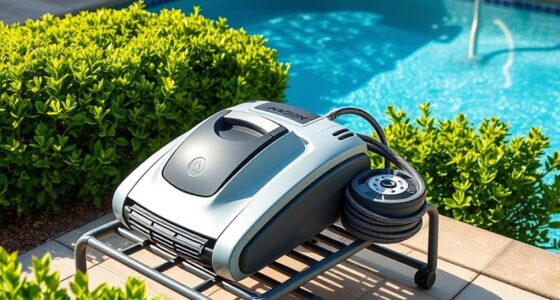If the water in your pool appears murky, smelly, or slimy, it’s a good idea to replace it. These symptoms may indicate a decline in water quality. Imbalances in chemicals can also cause problems. It is crucial to regularly test and maintain the pool water. Factors such as usage and climate determine how often the water should be replaced. Pools with hard water containing high levels of calcium may require more frequent changes. Monitoring Total Dissolved Solids (TDS) is important for maintenance. Pay close attention to signals from your pool – they are communicating more than you realize!
Key Takeaways
- Water quality testing determines the need.
- Factors like TDS levels and usage influence changes.
- Contamination signs signal necessary replacement.
- Regular maintenance prolongs water lifespan.
- Consult professionals for optimal change timing.
Signs of Poor Water Quality
If you notice cloudy water, foul odors, or slimy walls in your swimming pool, these are clear signs of poor water quality that require immediate attention.
When your pool starts looking more like a witch's cauldron than an invigorating oasis, it's time to roll up your sleeves and tackle the issue.
Cloudy water isn't just an eyesore; it can also harbor bacteria and algae that nobody wants to swim with.
Foul odors? Yeah, that's not the aroma of a tropical getaway; it's a red flag that your water is a breeding ground for nasties.
And slimy walls? That's a definite no-no – your pool should be sleek and inviting, not feeling like a science experiment gone wrong.
Impact of Chemical Imbalance
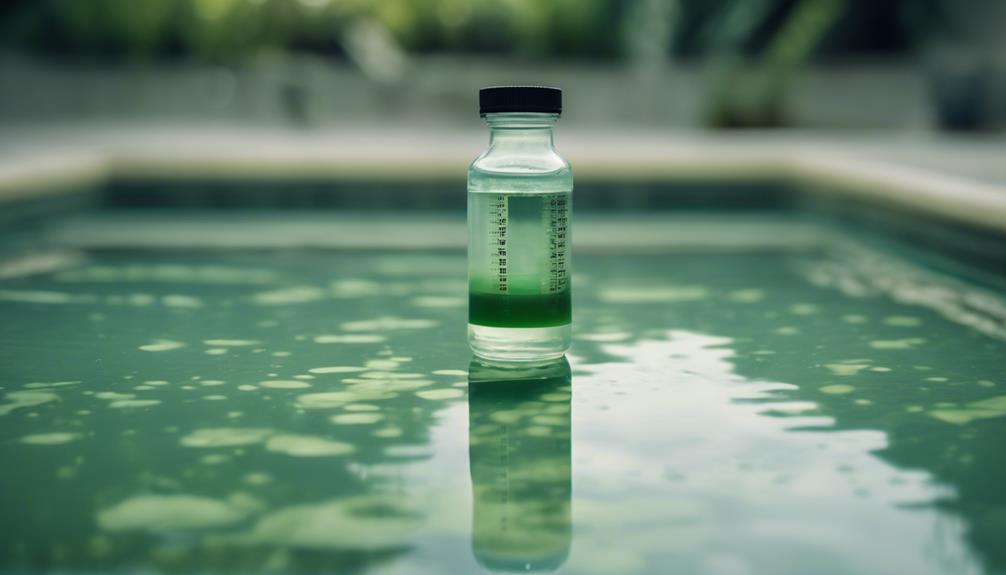
Chemical imbalance in your swimming pool can have a significant impact on water quality and sanitation effectiveness. When your pool's chlorine levels are off, it can lead to bacteria and germs not being properly eliminated, making your pool water unsafe.
pH levels play an important role too. If they're too high or too low due to a chemical imbalance, the chlorine won't work effectively, leaving your pool vulnerable. This imbalance can result in cloudy, murky water that's definitely not inviting for a swim.
Plus, algae love imbalanced chemicals; they thrive in these conditions, turning your pool into their own little green paradise.
To avoid these pool problems, regular testing and maintenance are key. Keep an eye on those chlorine and pH levels, making sure they're in the right balance. It's like a little science experiment right in your backyard!
Frequency for Water Replacement
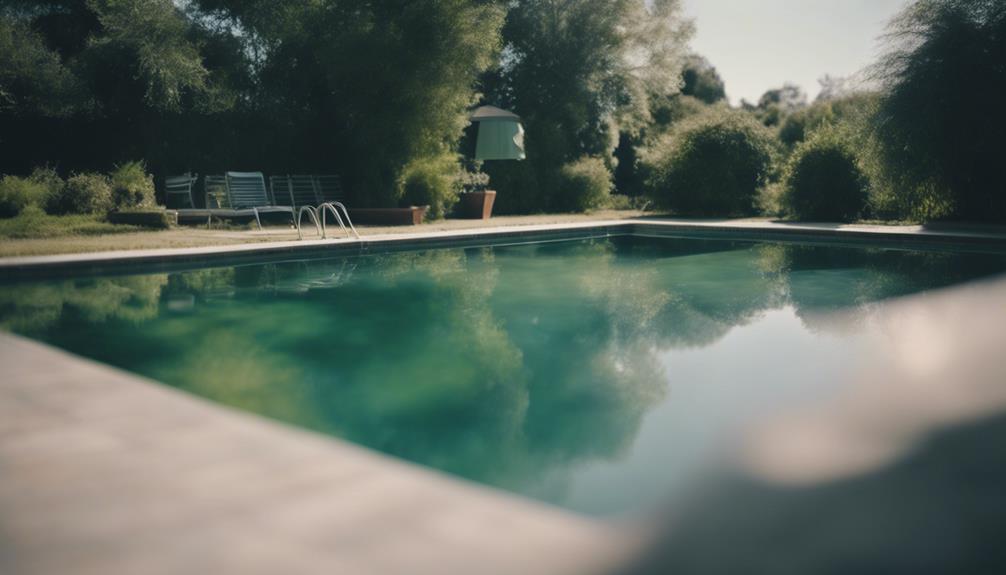
Let's talk about how often you should be changing your pool water.
The ideal water lifespan for pools usually falls between 5 to 7 years, but this can vary based on factors like how much you use your pool and where you live.
Keeping an eye out for signs of contamination and regularly testing your water quality are key to knowing when it's time for a rejuvenating change.
Ideal Water Lifespan
When it comes to the lifespan of your pool water, you might be wondering how often you need to change it. Well, the general rule of thumb is that pool water replacement frequency, influenced by factors like usage and climate, typically ranges between every 5 to 7 years.
To make your water last longer, it's important to keep up with regular swimming pool maintenance. This means ensuring your chlorine and pH levels are in check, and your filtration systems are working effectively. By maintaining these factors, you can extend the lifespan of your water and reduce the need for frequent replacements.
If you're unsure about when the ideal timing is to change your pool water, it's always a good idea to consult with a professional like Absolute Pool & Spa Care. They can assess your water quality and usage to determine the best time for a change.
Signs of Contamination
To determine when it's time for a water replacement in your swimming pool, pay close attention to signs of contamination that may indicate the need for immediate action. Signs like foul odors, green water, slimy walls, excessive debris, and cloudy water are red flags signaling your pool needs some TLC. Water quality issues, such as bacteria, algae spores, debris, and UV rays, can mess with your pool's purity, making regular inspections important. Keep an eye out for cloudy water, which can hint at unseen particles floating around, urging you to increase maintenance practices or consider a water replacement sooner rather than later. Factors like heavy pool usage and environmental conditions play a role in how often you might need to switch out the water to keep your swimming spot pristine. Let's delve into a table to highlight these signs and factors:
| Contamination Signs | Water Quality Issues | Maintenance Practices |
|---|---|---|
| Foul Odors | Bacteria | Regular Inspection |
| Green Water | Algae Spores | Proper Maintenance |
| Slimy Walls | Debris | Timely Water Changes |
Water Quality Testing
When considering the frequency for water replacement in your swimming pool, regular water quality testing is essential to gauge factors like pH levels and chlorine effectiveness. Monitoring water quality through testing not only helps you maintain a safe swimming environment but also prevents unnecessary water changes.
By testing for contaminants and checking the chemical balance, you can make sure that your pool water is in excellent condition for an invigorating swim.
Testing for pH levels is important because it indicates how acidic or basic your pool water is. If the pH levels are off, it can affect the effectiveness of chlorine in killing bacteria and keeping your pool clean. By keeping an eye on these levels, you can avoid any imbalances that might require a water change sooner than expected.
Preventative Maintenance Measures
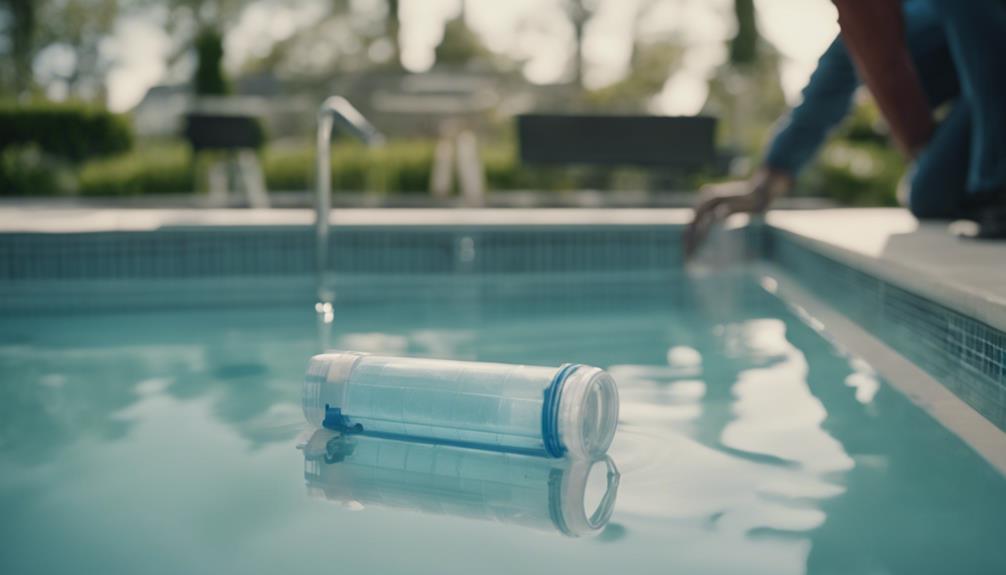
Implementing preventative maintenance measures is crucial for extending the lifespan of your pool water and minimizing the need for frequent water changes. To keep your pool water crystal clear and invigorating, regular swimming pool maintenance is key.
Make sure your filtration system is in top shape to trap dirt and debris, preventing them from clouding your water. Stay on top of your pool's chemical balance using a water testing kit to guarantee that pH levels and chlorine are just right, warding off any contamination issues.
Remember, a clean pool is a happy pool, so don't forget to scrub the walls and vacuum regularly to keep things spick and span. Encourage good hygiene habits like showering before a dip to reduce the risk of introducing unwanted bacteria.
Lastly, check your pool equipment often to catch leaks early and prevent any water loss or contamination. By following these simple steps, you can enjoy your pool without the hassle of frequent water changes.
Understanding Total Dissolved Solids (TDS)
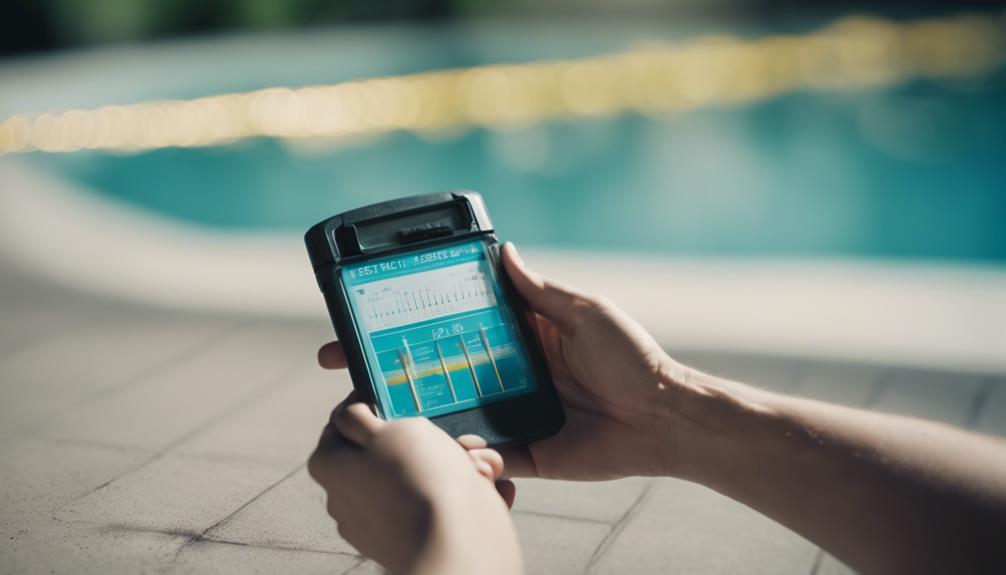
Guarantee the longevity and quality of your pool water by understanding Total Dissolved Solids (TDS), which encompass minerals, salts, and metals present in the water. Keeping an eye on TDS levels is essential for maintaining ideal water quality.
High levels of TDS can cause your water to become cloudy and make chemicals less effective, impacting your swimming experience. Regularly testing the TDS levels allows you to monitor the build-up of minerals and salts.
When TDS levels hit 1,550 ppm or higher, it's a sign that a water change may be necessary to ensure your pool water stays fresh and clean.
Factors Influencing Water Change
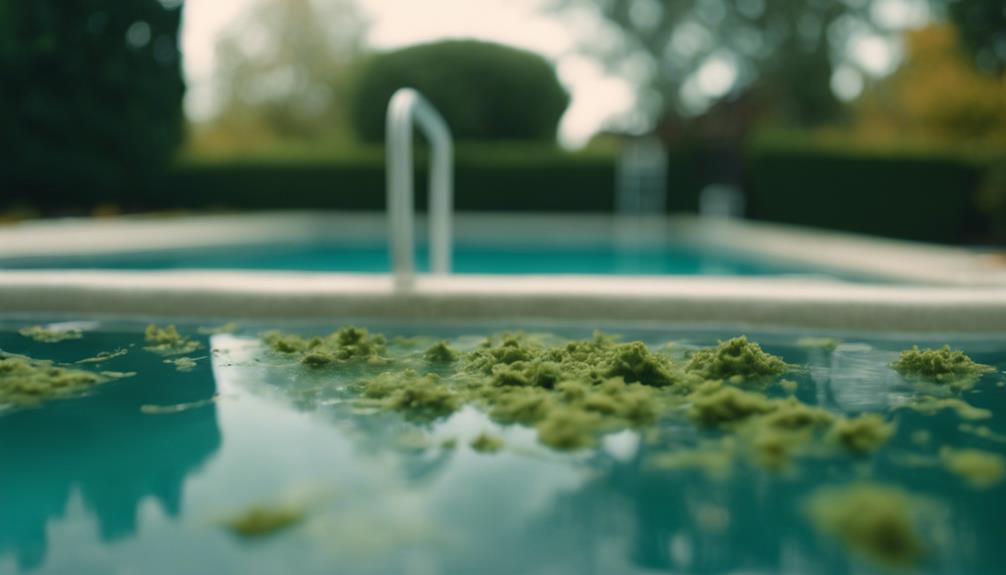
Understanding the various factors that influence the frequency of changing your pool water is essential for maintaining excellent water quality and clarity. Factors like pool usage, climate conditions, and water type often play a significant role in determining how frequently you should change your pool water.
For instance, if your pool has hard water with high levels of calcium, you might need to change the water more frequently compared to pools with soft water. Regular maintenance practices such as proper filtration and maintaining the chemical balance can also impact how often you need to change the water.
In swimming pools, water typically undergoes changes due to evaporation, filtration efficiency, and overall water quality. By keeping an eye on these factors, you can better assess when it's time to drain your pool and refill it with fresh water.
Frequently Asked Questions
Does Swimming Pool Water Ever Need to Be Changed?
Sometimes, you might wonder if your swimming pool water needs changing. The truth is, it's not often necessary! By staying on top of maintenance tasks like filtering and cleaning, your pool water can stay crystal clear for a long time.
Only consider changing the water if there's damage or repairs needed, not just for fun. And hey, when in doubt, reach out to experts for advice to avoid any pool mishaps! If you’re unsure whether your swimming pool needs a water change, it’s always best to consult with professionals who can assess the situation. They can offer guidance on whether a water change, pool repairs, or another form of maintenance is necessary. Additionally, they can provide advice on swimming pool nits treatment to ensure the water is safe and clean for swimming. It’s important to prioritize the safety and health of anyone using the pool, so seeking expert advice is key in preventing any potential mishaps.
What Happens if You Don't Change Pool Water?
If you don't change pool water, things can get messy! Total Dissolved Solids (TDS) rise, messing with water chemistry and sanitizer effectiveness.
Nasty stuff piles up, clouding your pool and making it a perfect spot for algae and bacteria to throw a party.
How Long Can You Keep the Same Water in a Pool?
You know, keeping the same water in your pool for too long is like trying to microwave a pizza for an hour – it's just not gonna end well.
Generally, pool water can hang in there for 2 months to 5-7 years before waving the white flag. But hey, factors like daily dips, weather, and how good you're at pool TLC all play a role in this aqua endurance test.
Is It OK to Reuse Pool Water?
Reusing pool water is totally fine as long as you keep it in tip-top shape. By filtering and balancing chemicals just right, you can make that water last longer.
Remember to test it regularly and stay on top of maintenance tasks. Only if there's a big mess or a serious problem should you think about changing the water.
Save yourself some trouble and avoid unnecessary water changes to keep your pool in great shape!
What Are the Consequences of Not Changing Swimming Pool Water and Putting Harmful Things in It?
Leaving swimming pool water unchanged can lead to the accumulation of worst swimming pool contaminants, like bacteria and algae, causing skin irritations and infections. Adding harmful chemicals or substances worsens the situation, posing serious health risks to swimmers and damaging pool equipment. Regular maintenance and water testing are crucial for a safe and enjoyable swimming experience.
Conclusion
So, next time you're wondering if you need to change your swimming pool water, just remember this: the average pool should have its water replaced every 5-7 years! That's right, 5-7 years!
Keeping an eye on signs of poor water quality and maintaining the chemical balance can help extend the lifespan of your pool water. Remember, a little prevention goes a long way in keeping your pool crystal clear and ready for a swim!


